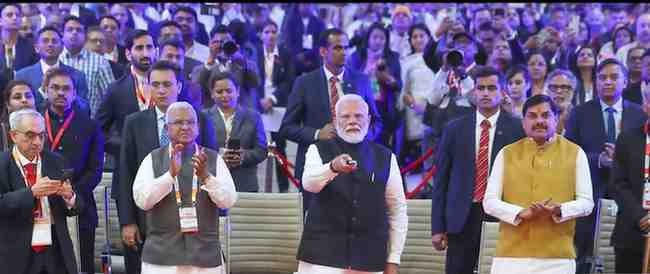Prime Minister Modi Lays Foundation of India’s First PM MITRA Textile Park in Dhar, Madhya Pradesh

across 2,158 acres in Dhar.
A Game-Changer for Cotton Farmers
The mega textile park is expected to directly benefit over 3.5 lakh cotton farmers across Madhya Pradesh. Instead of selling raw cotton at low prices, farmers will now see their produce transformed into high-value yarn, fabric, garments, and exports, ensuring that profits are shared across the value chain.
Madhya Pradesh is already a powerhouse in cotton, producing nearly 50% of India’s non-GM organic cotton and 24% of the world’s supply. Cotton fields in the state stretch across 6 lakh hectares in 18 districts, generating significant rural livelihoods. In the 2024–25 financial year alone, the state’s textile exports exceeded ₹9,200 crore, underlining its potential as a global cotton hub.
With investment proposals worth ₹23,146 crore already committed by leading textile companies, the park is set to create three lakh jobs, of which 60% are reserved for women—making it one of India’s largest employment-generation projects for women.
World-Class Industrial Township
Designed as a model industrial township, the Dhar PM MITRA Park will feature:
- A 20 million litre per day (MLD) common effluent treatment plant for sustainable operations.
- A 10 MVA solar power unit to promote clean energy.
- 81 plug-and-play factory units, ensuring quick setup for industries.
- Modern road networks, warehouses, and logistics hubs.
- Residential and hostel facilities for workers, particularly for women and youth migrating from rural and tribal areas.
Officials said the project would create a self-sustaining ecosystem, where cotton from farms will be processed, woven, stitched, and shipped to international markets—all within one integrated zone.
Voices of Leadership and Legacy
Welcoming the Prime Minister, Chief Minister Mohan Yadav said:
“We want Madhya Pradesh to emerge as the capital of the cotton industry, ensuring real benefits reach our farmers. This initiative will be remembered as a milestone in the state’s progress.”
He recalled that in earlier decades, cities like Indore, Dewas, and Ujjain were once thriving textile hubs with large cotton mills. The PM MITRA Park, he said, represents a revival of that tradition—“creating industries around every harvest” and empowering both farmers and artisans.
For Madhya Pradesh, which boasts a centuries-old textile legacy including Chanderi silks, Maheshwari weaves, Bagh prints, and Batik designs, the park represents a fusion of tradition and modernity, giving artisans global exposure while introducing advanced manufacturing technologies.
PM Modi’s Vision: 5F and Beyond
In his address, PM Modi reiterated the government’s “5F” vision for textiles—Farm to Fibre, Fibre to Factory, Factory to Fashion, and Fashion to Foreign. He said the Dhar park embodies this vision by seamlessly connecting farmers, weavers, designers, and exporters.
He also stressed that the initiative is not only about industrial growth but also about social empowerment:
- Farmers will earn better value for their produce.
- Women will find dignified employment close to home.
- Tribal youth will have modern job opportunities.
- Global buyers will see India as a trusted source of sustainable textiles.
Marking his birthday, Modi said, “This is my gift to the nation and to Madhya Pradesh. It will weave together India’s rich heritage with our modern aspirations.”
Part of a Nationwide Textile Revolution
The PM MITRA scheme, announced in 2021, plans to set up seven mega textile parks across India—in Tamil Nadu, Gujarat, Madhya Pradesh, Telangana, Karnataka, Uttar Pradesh, and Maharashtra.
Together, these parks are expected to attract ₹70,000 crore in investment and create 20 lakh jobs, giving India a competitive edge in the global textile market.
Each park will host the entire value chain, from fibre production and spinning to dyeing, garmenting, and exports, supported by skill development centres, research labs, and logistics corridors.
A Modern Milestone for Madhya Pradesh
The Dhar park is particularly significant for tribal and youth-dominated regions such as Dhar, Jhabua, Ratlam, and Ujjain. By creating employment locally, it promises to reduce migration, uplift tribal communities, and build a modern industrial ecosystem rooted in agriculture.
As PM Modi laid the foundation stone, the event was celebrated not just as an industrial milestone but as a historic turning point in Madhya Pradesh’s journey towards becoming a global textile hub.
With investments flowing, infrastructure rising, and farmers and weavers at its core, the PM MITRA Park in Dhar is being hailed as a new chapter in India’s textile story—where tradition meets technology, and rural dreams meet global markets.